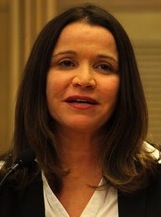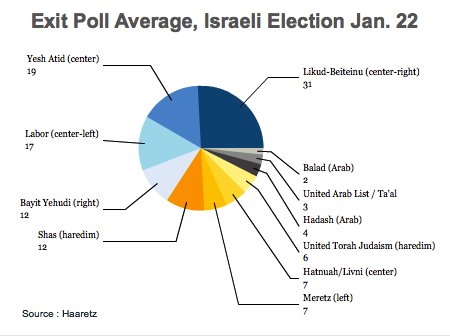Official results will start trickling in shortly from Israel, where it’s well past midnight, but we have some fairly strong exit poll data at this point.![]()
From the looks of things, the center-right and the ultraorthodox haredim parties have taken just slightly more seats than the center-left and the Arab parties in Israeli’s Knesset (הכנסת). Israeli voters went to the polls on Tuesday to elect all 120 members of the Knesset, Israeli’s unicameral parliament. Seats are awarded by proportional representation, with a threshold of at least 2% in voter support to win seats.
Here’s the breakdown of an average of the exit polls, as reported by Haaretz:
So on the basis of these results, who are the winners of today’s election?

Benjamin Netanyahu. His electoral bloc, dominated by Likud (הַלִּכּוּד, ‘The Consolidation’), has won by far the largest number of seats in the Knesset, and Netanyahu (pictured right) seems incredibly likely to return as prime minister for a third consecutive term at the head of a largely center-right coalition, no matter what any of his opponents are saying tonight.
Yair Lapid and his new centrist party. If exit polling is accurate, journalist-turned-politician Yair Lapid (pictured above) and his newly formed, social media-friendly, centrist Yesh Atid (יש עתיד, ‘There is a Future’) will have won 19 seats. That’s an incredible result, given that Lapid entered politics just a year ago. If Netanyahu wants to form a broad centrist coalition (as opposed to a more right-wing coalition), he’ll have to do it with Yesh Atid, which means Lapid will be a key player in the next government.
The economic left. Today’s election was the first since the widespread social justice protests in 2011, during which many Israelis vocally demanded more investment in housing, health care and education and decried the growing income inequality in Israel. To some degree, Lapid appealed to many Israelis who want a more centrist approach to spending. But Labor (מפלגת העבודה הישראלית), which based its campaign on greater spending (balancing the budget through a tax increase, not cuts), has gained seats in today’s election, and the only truly leftist party, Meretz (מרצ, ‘Energy’), has apparently won seven seats, doubling its current representation in its best performance since the 1999 elections.
Naftali Bennett.  OK, OK, so he didn’t win quite as many seats as expected, and he’s not in a commanding position to be dictating orders to Netanyahu. But as the new leader of Bayit Yehudi (הבית היהודי, ‘The Jewish Home’), Bennett (pictured right) has quadrupled his party’s position in the Knesset. Despite leading a largely religious Zionist party, he found ways to appeal to secular voters as well — in some ways, given his relative novelty, he’s tapped into the same dynamic as Lapid by mining voters who are looking for change. If Netanyahu hunkers down with a right-wing coalition rather than a centrist one, Bennett — who, as a former Netanyahu chief of staff, has a complicated relationship with the prime minister — could become a key player in the next government as well.
OK, OK, so he didn’t win quite as many seats as expected, and he’s not in a commanding position to be dictating orders to Netanyahu. But as the new leader of Bayit Yehudi (הבית היהודי, ‘The Jewish Home’), Bennett (pictured right) has quadrupled his party’s position in the Knesset. Despite leading a largely religious Zionist party, he found ways to appeal to secular voters as well — in some ways, given his relative novelty, he’s tapped into the same dynamic as Lapid by mining voters who are looking for change. If Netanyahu hunkers down with a right-wing coalition rather than a centrist one, Bennett — who, as a former Netanyahu chief of staff, has a complicated relationship with the prime minister — could become a key player in the next government as well.
The Palestinian peace process. ![]() If Lapid joins Netanyahu’s government, with or without Bennett’s party, it will pull the Netanyahu government away from its pessimistic position on Palestinian negotiations. In a world where outgoing defense minister Ehud Barak will either return as defense minister or perhaps be appointed as ambassador to the United States and where former nationalist foreign minister Avigdor Lieberman remains sidelined, Lapid’s conciliatory presence in the government would give some momentum for a peace process that was left for hopeless through much of the campaign.
If Lapid joins Netanyahu’s government, with or without Bennett’s party, it will pull the Netanyahu government away from its pessimistic position on Palestinian negotiations. In a world where outgoing defense minister Ehud Barak will either return as defense minister or perhaps be appointed as ambassador to the United States and where former nationalist foreign minister Avigdor Lieberman remains sidelined, Lapid’s conciliatory presence in the government would give some momentum for a peace process that was left for hopeless through much of the campaign.
The Lebanonization of Israeli politics.![]() Currently, it looks like either 11 or 12 parties will enter the Knesset, with no party winning over 31 seats, and only one party winning more than 20. The days of a more-or-less two party system, with the center-right Likud competing against the center-left Labor, are over. That means that not only will Israeli politics become more fragmented and polarized (Israeli elections are starting to resemble a kind of de facto form of confessional representation characteristic of its northern neighbor Lebanon) — but that Netanyahu and future prime ministers will find it increasingly difficult to mobilize a coalition for major policy initiatives.
Currently, it looks like either 11 or 12 parties will enter the Knesset, with no party winning over 31 seats, and only one party winning more than 20. The days of a more-or-less two party system, with the center-right Likud competing against the center-left Labor, are over. That means that not only will Israeli politics become more fragmented and polarized (Israeli elections are starting to resemble a kind of de facto form of confessional representation characteristic of its northern neighbor Lebanon) — but that Netanyahu and future prime ministers will find it increasingly difficult to mobilize a coalition for major policy initiatives.
Who are the losers?
Benjamin Netanyahu. Yes, he won the election in a technical sense, and yes, he’ll most likely return as prime minister. But the election marks a loss of probably 11 seats for Netanyahu, Likud and his electoral partner, Yisrael Beiteinu (ישראל ביתנו, ‘Israel is Our Home’). He’ll start off his third term in a weaker position than in his prior term, and in what appears to be a more polarized Knesset, he’ll find it more difficult to build a government that can achieve his goals on Iran, on budget cuts, on settlements, on exempting the haredim from national service.
Avigdor Lieberman.  The former foreign minister (pictured right) remained on the sidelines throughout much of the election, meaning that turnout was depressed among the Russian-born Jews that powered his nationalist rise in the 2009 elections. He’s on the sidelines, by the way, due to an indictment for breach of public trust, and his legal problems may prevent him from returning to the Knesset, let alone as foreign minister. Joining Likud, however, in a formal electoral coalition, has probably inflated his party’s result (to Likud’s detriment), and he and his MKs will probably have an important say as to whether Netanyahu’s coalition should tilt to the right or to the center.
The former foreign minister (pictured right) remained on the sidelines throughout much of the election, meaning that turnout was depressed among the Russian-born Jews that powered his nationalist rise in the 2009 elections. He’s on the sidelines, by the way, due to an indictment for breach of public trust, and his legal problems may prevent him from returning to the Knesset, let alone as foreign minister. Joining Likud, however, in a formal electoral coalition, has probably inflated his party’s result (to Likud’s detriment), and he and his MKs will probably have an important say as to whether Netanyahu’s coalition should tilt to the right or to the center.
Arab parties. If polls are accurate, the three major Arab parties will have lost two seats, and one exit poll even forecast that Balad (التجمع الوطني الديمقراطي, ‘Country or Nation,’ or ברית לאומית דמוקרטית, ’National Democratic Assembly’) may even fail to hit the 2% threshold — that means although Israeli Arabs represent 20% of the population, they’ll control 7.5% of the Knesset. Apathy had been a major concern of all three Arab parties heading into the election, and it looks like, despite strong turnout overall, Arab turnout wasn’t high enough to boost their fortunes in 2013.
Kadima. Kadima (קדימה, ‘Forward’), which held 28 seats in the prior Knesset, has apparently been reduced to zero seats in today’s election (though preliminary results show that it’s hovering right under the 2% level). That isn’t surprising — it had been forecast to win two seats at most. So ends the great centrist experiment that former prime minister Ariel Sharon initiated in 2005 as a vehicle for peace. Kadima’s obliteration leaves former prime minister and current president Shimon Peres without a party (he left Labor for Kadima in 2005). It also means that former Kadima prime minister Ehud Olmert, who sat out this election pending an appeal of his acquittal on corruption charges, will also need to find a new party.

Tzipi Livni. After losing the Kadima leadership in March 2012, Livni (pictured left) abruptly exited politics, but returned just in time to further fragment the center-left by forming Hatnuah (התנועה, ‘The Movement’). Hatnuah’s seven seats are better than nothing, of course, but it’s hard not to think of them as the rump of what used to be Kadima’s 28-seat bloc in the prior Knesset. Livni, a former foreign minister, will likely not join Netanyahu’s coalition without obtaining the foreign ministry post and a more conciliatory posture toward the Palestinian negotiations (don’t hold your breath), so it remains to be seen if she’ll stick around leading such a small opposition faction.
Shelly Yacimovich.  In one sense, Yacimovich (pictured right) is a winner — Labor has gained seats and more than anyone else, Yacimovich has become the chief proponent of progressive economic policy in Israel. But with Yesh Atid, Meretz and Livni all stealing support from center-left voters, and Yacimovich’s inability to assert a strong voice on national security, Labor’s 17 seats are far fewer than it probably could have won. Her best hope is that Lapid joins Netanyahu in government, ceding the opposition spotlight solely to Yacimovich.
In one sense, Yacimovich (pictured right) is a winner — Labor has gained seats and more than anyone else, Yacimovich has become the chief proponent of progressive economic policy in Israel. But with Yesh Atid, Meretz and Livni all stealing support from center-left voters, and Yacimovich’s inability to assert a strong voice on national security, Labor’s 17 seats are far fewer than it probably could have won. Her best hope is that Lapid joins Netanyahu in government, ceding the opposition spotlight solely to Yacimovich.


2 thoughts on “Winners and losers in today’s Israeli election”